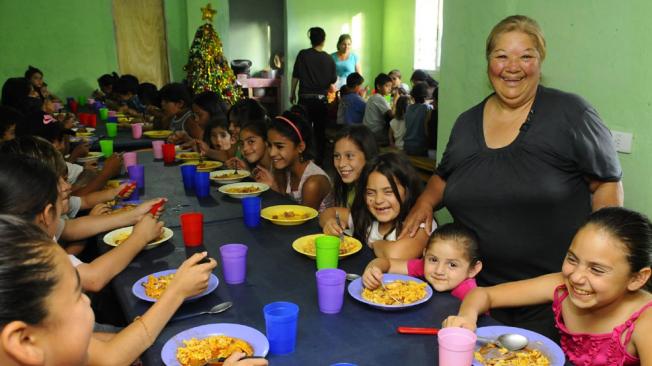
When you want to help, the loaves multiply

Adela prepares afternoon snack and supper in the El Quebracho neighborhood for 130 children who live in extreme poverty
by Rosana Guerra
For the past 16 years Adelina “Adela” Milla prepares an afternoon snack and supper in the El Quebracho neighborhood of the city of Córdoba for 130 children who live in extreme poverty.
She had hardly moved to the neighborhood in 1987 when the kids knocked on her door asking for a piece of bread or some milk. With no hesitation she spoke with her husband about the idea of opening a canteen. “I told him that I'd like to have one in our house. He said it would be a lot of work, and I answered: I want to do it.”
And she did. The canteen Pancitas Tristes [Sad Little Bellies – doesn't work in English, but you get the idea. Trans.] began in her living-room. And her husband, seeing his wife so determined, not only acceded to her wish, but joined in the project.
“I agreed and the canteen opened in the living-room. Until one day I said, Adela, I have to be a juggler to watch TV with all these kids in the house,” Miguel says with a smile. It was then that he decided to build an extension at the rear of the house with his own hands. So with his brother's help he built a dining-room with toilette and kitchen.
Adela's quiet labor has always been accompanied by an attitude of perseverance and love. “Until about 15 days ago I cooked with a common stove. So I began to prepare the afternoon snack and the supper at three in the afternoon,” she says.
After 16 years an industrial stove arrived, so she and Teresa Moreno, another volunteer, now begin preparing the supper later, about five in the afternoon so that all will be ready when the children arrive at seven o'clock.
Perhaps it's because she lived through a situation of extreme need with her own children that Adela cannot bear to think that other children must do the same. “I will never forget the day in the Cárcano neighborhood that Yalanda Colazo, “La Gorda Pepa”, opened her door to me and when I asked for something to eat she gave me two large plastic bags of food and some coins to buy meat for my children,” she adds emotionally.
Asking for help.
When the canteen first opened in 1995 she spoke to a group of mothers and they went house to house and to shops asking for donations in neighborhoods like Pilar, José Ignacio Díaz, Corral de Palos, and Nueva Córdoba. “Although many doors were slammed in our faces, we were lucky. The neighbors gave us noodles, rice, cornmeal, oil and bread. And we cooked with wood because there was no gas then.”
It took three years before they received help from the provincial government. “Afterward they gave us some economic help but since May of this year we haven't received anything.”
When help from the government stopped, her husband helped her make homemade bread to sell in order to buy meat for the children's meals. “The problem is that our volunteers were on relief from the state, and when that ended they left. The only one who stayed is Tere Moreno, who helps me a lot,” Adela says.
She knows that the supper she provides is for some of the children the only meal they will get until the next day. Adela is convinced that when she wants to serve, although there may be few loaves, they multiply, “I give thanks to God because every day I have more help, and not only food. The tables were donated and the new wooden benches and even the Christmas tree,” she adds with unbreakable faith.
The family
Adela (56) is a housewife and has two children – Elizabeth (22) and Daniel (21). Her husband is a mason and installs membrane insulation for roofs. And her daughter Eli also helps in the kitchen.
Ana María, one of her nieces, is proud of her work. “It's a joy that she can help the kids who need it. One day when they grow up they will remember my aunt and the canteen,” she says.
“It makes me happy when the children thank me with a kiss or simply a greeting. And some don't say thank you, but it's not because they don't value what they're getting, but because nobody ever taught them to give thanks,” Adela observes.
Over the years she has discovered that those who give most are those who have less. “The women I saw with painted lips shut the door in my face. We have had many slammed doors, but also much help, more from the poor than from the well-off. If I could open on weekends, I would. But I think that if there were enough work for everyone, the canteens shouldn't exist,” she finally says.
To help
Pancitas Tristes is a canteen located in the El Quebracho neighborhood. It is open Mondays through Fridays. At 4 P.M. a glass of milk as served and at 7 P.M. supper for children from 1 to 14 years of age. Between 70 and 130 children are served.
What is needed: non-perishable food such as noodles, rice, oil, sugar, chocolate, flan, gelatine and children's sneakers.
More information: Telephone (0351) 497-5868 from 12 to 7 P.M.
This article appeared in “La Voz del Interior”, Córdoba, Argentina, December 19, 2011.
Translation: Frank Thomas Smith
Home